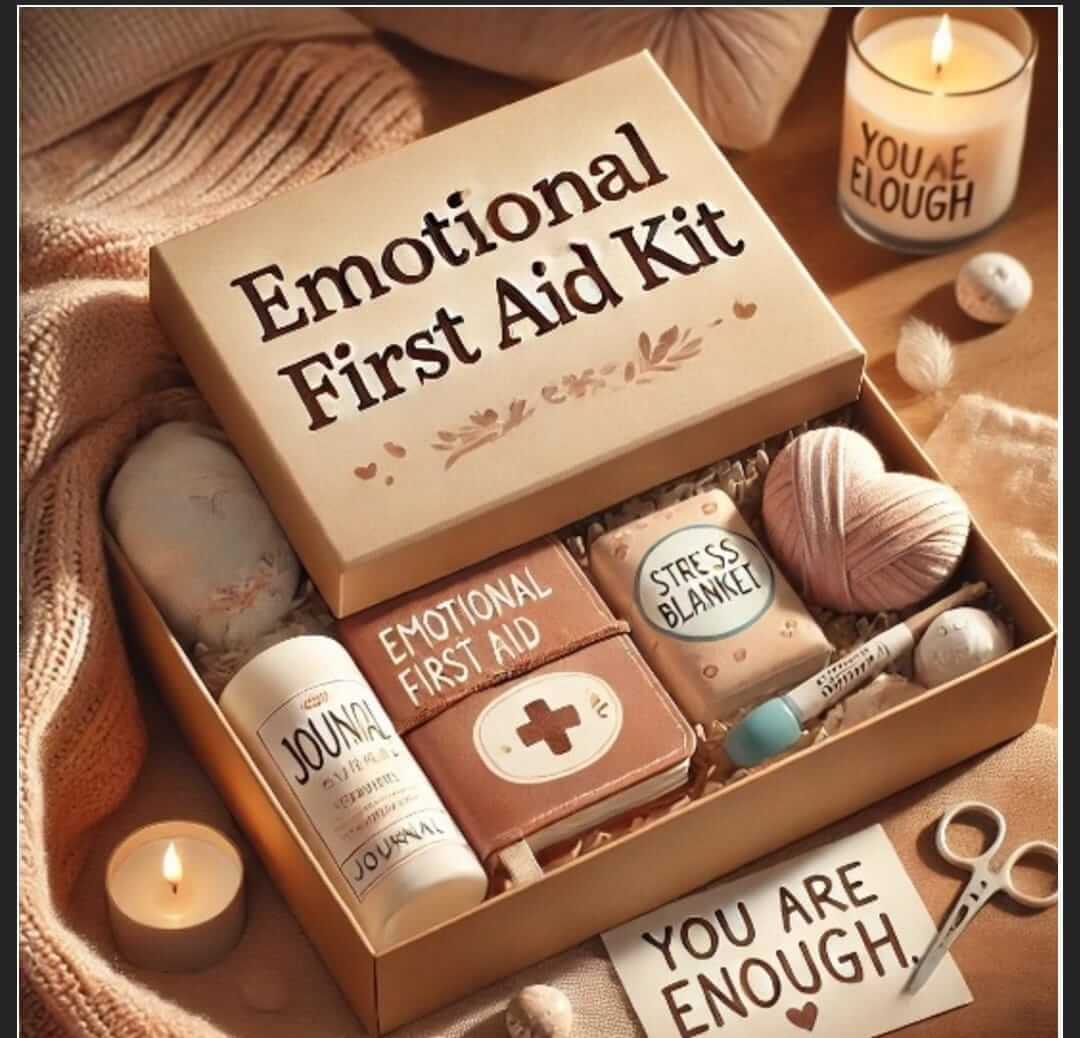Emotional – First aid kit.
By KKR

Introduction:
The first time I heard the term Emotional First Aid Kit I was like, “what the what?” Turns out, it’s a pretty cool thing and something I believe we could all benefit from having. Much like a regular first aid kit, an emotional one helps to fix invisible boo-boos and offers up immediate relief for when you are not feeling quite like yourself. Let’s face it, we all have bad days. Maybe a project you were working on was given a negative review. Perhaps you had a huge argument with your spouse or children. Maybe even a health issue is not moving in the direction you wanted. There are many reasons a person will feel “off” and even the strongest person out there may have trouble dealing with these sudden changes in mood, temperament, etc.
How to create a personal Emotional First – Aid Kit
1.Love Notes from Friends
Meaning:
Messages of love, encouragement, and support from your close circle. These remind you that you’re valued and not alone.
Example: Screenshot sweet texts or keep physical letters.
2.Sadness Gauze
Meaning:
Emotional support or soothing activities that help “wrap up” and tend to sadness.
Example: 1.Watching a comforting movie
2. Talking to a therapist or trusted friend
3.Confidence Supplements
Meaning:
Things that boost your self-esteem and remind you of your strengths.
Real Example:1.A list of your achievements
2.Use daily affirmations or a pep-talk audio
4.Social Burn Ointment
Meaning:
Tools for healing after awkward or painful social interactions (e.g., rejection, embarrassment).
Real Example:1.Self-compassion journaling .
2.A meme or video that makes you laugh about it.
5.Negative Thought Wipes
Meaning:
Techniques or tools to help you clean away intrusive or harmful thoughts.
Real Example:cognitive reframing exercisesMindfulness or thought-challenging prompts.
6.Ice Pack for Bruised Ego
Meaning:
Comfort for times you feel humiliated, criticized, or insecure.
Real Example: Reflective writingReading past compliments or accomplishments.
7.Rejection Bandages
Reminder that rejection is not a reflection of your value
Why You Need an Emotional First Aid Kit
1.Helps you manage emotional pain in a healthy way.
2.Prevents negative emotions from spiraling out of control.
3.Builds resilience and emotional strength over time.
4.Encourages self-care and self-awareness.
Essential Tools for Your Emotional First Aid Kit
Grounding Techniques (For Anxiety & Overwhelm)
✔ 5-4-3-2-1 Method – Name 5 things you see, 4 things you touch, 3 things you hear, 2 things you smell, 1 thing you taste.
✔ Deep Breathing (4-7-8 Method) – Inhale for 4 seconds, hold for 7, exhale for 8.
✔ Holding an Object – A stress ball, stone, or textured item can provide physical grounding.
Self-Compassion Reminders (For Self-Doubt & Criticism)
✔ Affirmations – “I am enough,” “This feeling is temporary,” “I am doing my best.”
✔ Letter to Yourself – Write a compassionate letter to yourself as if you were comforting a friend.
✔ Self-Hug or Gentle Touch – Place your hand on your heart or hug yourself for comfort.
Emotional Release Tools (For Sadness & Frustration)
✔ Journaling – Write freely about your feelings without judgment.
✔ Crying – Allow yourself to cry and process emotions instead of suppressing them.
✔ Physical Activity – Walk, dance, or do yoga to release built-up stress.
Mindfulness & Distraction (For Negative Thought Spirals)
✔ Meditation Apps – Try Headspace, Calm, or Insight Timer.
✔ Creative Outlets – Drawing, painting, or playing music can help shift your focus.
✔ Engaging in a Hobby – Reading, puzzles, or gardening can help redirect energy.
Connection & Support (For Loneliness & Emotional Pain)
✔ Call a Friend or Family Member – Sometimes, just talking helps.
✔ Support Groups or Therapy – Seek guidance from professionals or community groups.
✔ Pet Therapy – Spending time with a pet can offer comfort and companionship.
Comfort Items (For Security & Reassurance)
✔ A Favorite Blanket or Sweater – Physical comfort can help calm emotions.
✔ Essential Oils or Scented Candles – Lavender and chamomile promote relaxation.
✔ A Playlist of Soothing Music – Create a list of calming or uplifting songs.
Conclusion:
Just as we care for physical wounds, tending to our emotional well-being is essential for resilience and healing. An Emotional First Aid Kit equips you with tools to manage stress, anxiety, sadness, and self-doubt in a healthy way. By incorporating grounding techniques, self-compassion, emotional release, mindfulness, and connection, you create a personal support system that nurtures your mental health.The key is to practice using these tools regularly, not just in moments of crisis. Over time, this strengthens your emotional resilience, helping you respond to life’s challenges with greater confidence and self-care. Your emotions deserve attention, and with the right tools, you can heal, grow, and thrive.
References
Winch, G. (2013). Emotional First Aid: Healing Rejection, Guilt, Failure, and Other Everyday Hurts.
Emotional First Aid – UR Medicine
Emotional First Aid Kit – Women’s Integrative Counseling
How To Prep A Mental Health First Aid Kit – Bradley REACH
Quick Links
Contact Us
📧 helpdesk.3dt.cc@gmail.com
📱 +91 8529175366
Copyright © 2025 | After Interval by KKR. All rights reserved.| Privacy Policy |Terms of Service | Disclaimer | Refund Policy
Website built with heart and intention